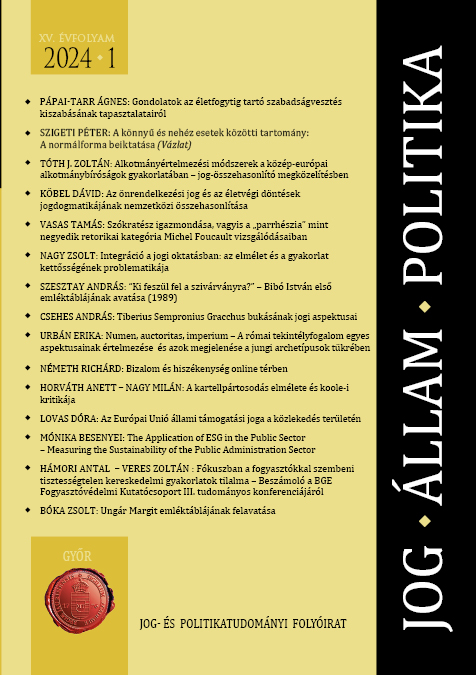Szókratész igazmondása
vagyis a „parrhészia” mint negyedik retorikai kategória Michel Foucault vizsgálódásaiban
| LETÖLTÉS |
Jog-Állam-Politika, 2024/1.77 |
vasas tamás
ABSTRACT
Through the examination of Foucault’s treatises, I seek to uncover how the concept of “parrhesia” within the rhetorical discourse and context system of justice, as interpreted by Foucault, sheds light on discussions about truth and legal theory, providing a facet for analysis in investigations. Is there a quasi-functional truth, stemming from the substantive aspects of justice, that exists independently and separately, capable of resolving issues with or without an intrinsic, self-interested value? Can there be a discourse of truth devoid of function, where the value of truth exists inherently within the justice system? The legal philosophy, legal rhetoric, state and political philosophical discourses are becoming more and more interesting these days. Beyond classic legal reasoning and rhetorical formulas, they represent the frontiers of jurisprudence, exploring interdisciplinary relationships and itemized jurisprudence. This scientific legal reasoning also significantly influences the methodology of legal studies, as elucidated by Foucault’s rich and complex analyses. A language-philosophical and rhetorical system with ancient roots consists of elements that constructively color its spectrum, both theoretically and in its application to legal reasoning, falling within its scientific domain.
KEYWORDS
legal reasoning | justification | political philosophy | antique legal thinking | history of bureaucracy | discursiveness
BIBLIOGRAPHY
Arisztotelész (1994): Politika. Gondolat, Budapest.
Balikó György (2006): A daimón útja. In: Magyar filozófiai szemle. 50. évf., 2006/3-4. sz.
Cseke Ákos (2018): Jézus, a cinikus. Michel Foucault cinizmus- értelmezésének egy aspektusáról. In: Vallástudományi Szemle. 14. évf., 2018/3. sz.
Foucault, Michael (1991): A diskurzus rendje. In: Holmi. 1991/7. sz.
Foucault, Michael (2019): Az igazság bátorsága. Atlantisz, Budapest.
Gelenczey-Miháltz Alirán (2011): Király és türannosz, avagy legitimálható-e a türannisz. In: Kellék. 2011/45. sz.
Gustav Henningsen (1988): A boszorkányok ügyvédje. A baszk boszorkányság és a spanyol inkvizíció (1609-1614). Kossuth Kiadó, Budapest.
Gyekiczky Tamás (2019): Újragombolva (A jog kutatásának lehetőségei Michel Foucault után). In: Jogtudományi Közlöny. 2019/74. sz.
Hamvas Béla (2015): Scientiasacra I. Medio, Budapest
Hegyi Dolores – Kertész István – Németh György – Sarkady János (2002): Görög történelem – A kezdetektől Kr.e. 30-ig. Osiris kiadó, Budapest.
Katolikus Biblia, Ez. 3.16-3.18.
Őri Sándor (2012): Konfuciusz bölcseletei. Golden Goose, Budapest.
Platón (1957): Szókratész védőbeszéde. Európa kiadó, Budapest.
Szilágyi János György (szerk.) (1980): Míg élők közt leszel élő. Epigrammák a Görög Antológiából. (Ford. Somlyó György). Európa Könyvkiadó, Budapest.

